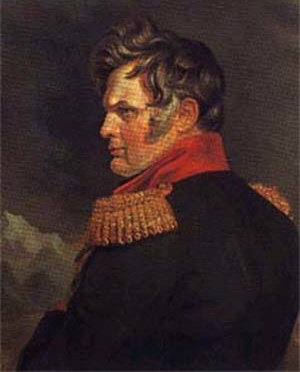The directory «Plots of stamps in the catalogue»
Yermolov (Åðìîëîâ) Aleksey Petrovich
(1777—1861)

Aleksey Petrovich Yermolov (or Ermolov), was the premier Russian military hero during the golden age of Russian Romanticism. His charismatic leadership of imperial armies was praised in the poems by Alexander Pushkin, Vasily Zhukovsky, and others.Yermolov was born on May 24, 1777 in Moscow in the officer's family. He studied at the school of the Moscow University and entered the army in 1791. After seeing some service under Suvorov in the Polish campaign of 1794 and under Zubov in the War with Persia (1796), he was accused of libertarian views and exiled to Kostroma (1798-1801). Upon being pardoned, Yermolov started studying the works of Suvorov, whose disciple he now considered himself. His own military genius blossomed in the Napoleonic wars. During Napoleon's invasion of Russia, he distinguished himself at Valutino, Maloyaroslavets, and especially at Borodino. His astonishing prowess won him admiration of the commander-in-chief, Prince Kutuzov, on whose recommendation he was appointed to command the general staff of united armies. During the European campaigns of 1813 and 1814, Yermolov was in charge of the artillery corps of the allies. His able command proved crucial for their success in the Battle of Kulm. Since 1816, Yermolov (by that time promoted to the rank of full artillery general) was responsible for Russian military policies in Caucasus. For ten years he was both commander-in-chief of the Georgian armies and the imperial ambassador in Persia. His freedom-loving character would often lead him to conflicts with the Ministry of War. But he was adored by his soldiers and generally successful in his subjugation of highlanders of Dagestan. The Decembrist officers were also among his admirers; this connection brought his career to an abrupt end in 1827, when Nicholas I made him resign his posts, or otherwise face charges of siding with the Decembrists. During the last 30 years of his life, Yermolov lived in seclusion at his manor near Orel. He was asked to lead a peasant militia during the Crimean War but declined on account of poor health. He died on April 11, 1861 in Moscow and was buried in Orel. Yermolov's memoirs were published posthumously in two volumes.
St. Vincent, 2004, Portrait of General Alexey Yermolov
Russia, 1995.05.06,  Museum-Panorama «Borodino Battle», statue of Kutuzov
Museum-Panorama «Borodino Battle», statue of Kutuzov
Russia, 2001,  The Council of War at Fili
The Council of War at Fili
USSR, 1953.03.18,  The Council of War at Fili
The Council of War at Fili
USSR, 1962.09.01,  The Council of War at Fili
The Council of War at Fili
USSR, 1978.01.09,  Museum-Panorama «Borodino Battle»
Museum-Panorama «Borodino Battle»
USSR, 1978.12.22,  Kutuzov monument in Moskow
Kutuzov monument in Moskow
USSR, 1982.09.23,  Museum-Panorama «Borodino Battle»
Museum-Panorama «Borodino Battle»